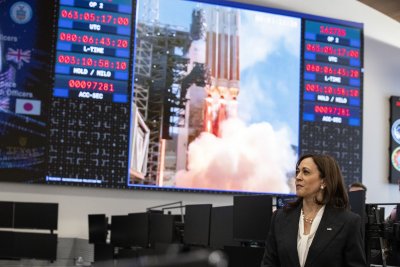
1/3

U.S. Vice President Kamala Harris at the Command Space Operation Center at the Vandenberg Space Force Base in Lompoc, California, on Monday announced the United States’s commitment to ban anti-satellite tests. Pool photo by Etienne Laurent/UPI | License Photo
April 18 (UPI) — Vice President Kamala Harris announced the United States’ commitment to not conduct anti-satellite missile tests, making it the first country to institute the self-imposed ban against the destruction of orbitals that jeopardize the long-term sustainability of space.
“Simply put, these tests are dangerous and we will not conduct them,” she said.
Harris announced the ban Monday night before soldiers at the Vandenberg Space Force Base after having toured it earlier in the day as the first presidential visit to the base near Santa Barbara of the Biden administration.
Harris said Monday that the United States hopes other nations, whether spacefaring or not, follow it by instituting their own self-imposed anti-satellite missile test bans as it is in the world’s best interest to do so.
“This will benefit everyone, just as space benefits everyone,” she said.
Only the four countries of the United States, China, Russia and India have conducted what are called direct-ascent anti-satellite missile tests when a rocket is fired at an orbital with the purpose of destroying it.
NASA has previously condemned these tests as the space debris they create poses a threat not only to the International Space Station and other satellites but to future space travel.
According to NASA, there are millions of pieces of space debris flying around low-Earth orbit, with some 23,000 pieces larger than a softball, though a collision between even a small piece of debris and a spacecraft could create serious damage — a risk that increases with every anti-satellite test.
Some 2,800 pieces of debris remain in Earth’s orbit from China’s anti-satellite test in 2007 and some 1,600 pieces were added by a Russian ASAT test in November, Harris said, describing the tests by adversaries as part of weapon systems intended to deny the United States’ ability to use its space capabilities by destroying its satellites.
“Without clearer norms, we face unnecessary risks in space,” she said. “The United States will continue to be a leader in order to establish, to advance and demonstrate norms for the responsible and peaceful use of our space.”
Harris made the announcement after visiting members of the Space Force, which was established under former President Donald Trump. She also received a briefing on national security work being done by the newest branch of the military.
Former Vice President Mike Pence visited Vandenberg in 2019. The base is one of six possible locations for the Space Force’s training and readiness command headquarters, known as Starcom, according to KNBC-TV.
Starcom is currently located in Colorado, home to the Schriever Space Force Base, near Colorado Springs, and Peterson Space Force Base in Colorado Springs. The Army and Navy had jointly operated Starcom in the past.
The transfer included a total of 15 global units with 319 military and 259 civilian billets.
“We’re one team with our sister services and over the last year and a half we have worked with the Army and Navy and Air Force to determine which capabilities come over to the Space Force,” Gen. John W. “Jay” Raymond, chief of space operations said then about the development of Starcom.
